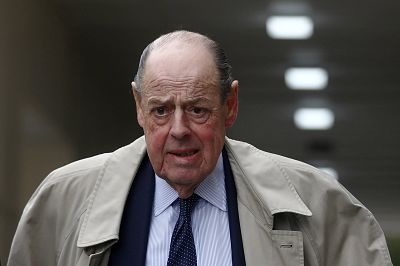"The country must now decide whether the leader of the opposition or I go to those negotiations in Brussels," Boris Johnson said.
LONDON — Britain's House of Commons approved a bid by lawmakers to stop the country leaving the European Union in October without a deal — dealing a blow to Prime Minister Boris Johnson's plans to exit the 28-nation bloc by the current deadline, "do or die."
Lawmakers hope to have it passed into law by the end of the week. But pro-Brexit members of the House of Lords — which is set to debate the motion — are threatening to try to stop it by filibustering.
Johnson also asked lawmakers to back his call for a snap election on Oct. 15, saying "there is only one way forward for the country" — a vote to determine who should govern.
"The country must now decide whether the leader of the opposition or I go to those negotiations in Brussels on the 17th of October to sort this out," Johnson said, referring to crunch Brexit talks in the Belgian capital.
Many lawmakers say they want a snap election to get rid of Johnson, but only after they force him by law to seek an extension for Brexit.
Johnson became prime minister only six weeks ago, and the vote Wednesday was his second major defeat on only his third day of Parliament.
The vote was a prime example of how British politics have been paralyzed by the question of how and when the U.K. should leave the E.U. — an issue that has obsessed the country since the June 2016 referendum approving Brexit amid a surge of anti-establishment anger.
News
On one side are those who argue that being a member of the E.U. has led to decades of peace and prosperity. And most economists believe leaving the union without agreements covering trade, immigration and other issues will do great harm to the economy.
Critics of staying in the bloc say that membership erodes U.K. sovereignty and the ability to cut valuable deals with other countries, and that the E.U.'s open borders have led to a dangerously large influx of migrants to the U.K.
The debate over Brexit — and whether to leave regardless of an agreement — has consumed a number of the ruling Conservatives' leading lights, including former Prime Minister David Cameron, who stepped down after calling for the 2016 referendum to resolve a debate long roiling the party. Johnson's predecessor, Theresa May, also resigned after failing to win support for the exit deal she painstakingly negotiated with the E.U.
Johnson came to power promising to drive Brexit through, deal or no deal, banish "negativity" and make the U.K. the "greatest country on earth."
But on Tuesday, he lost his slim one-vote majority when a member of his Conservative Party defected to the opposition Liberal Democrats on live TV, making the passage of the government's Brexit proposals through Parliament all but impossible.
Later, Ken Clarke, the longest sitting British lawmaker in the House of Commons, former Treasury chief Philip Hammond and Nicholas Soames, grandson of Winston Churchill — Johnson's political idol and the subject of one of his books — were among the 21 Conservatives expelled from the party for voting to wrest control of the parliamentary agenda away from Johnson's government.
"I am truly very sad that it should end in this way, and it is my most fervent hope that this house will rediscover the spirit of compromise, humility and understanding that will enable us finally to push ahead with the vital work in the interests of the whole country," a choaked-up Soames told Parliament earlier on Wednesday.
Membership in the E.U. has also divided the opposition Labour Party, which has been accused of zig-zagging on Brexit. On Wednesday, leading party members said they wanted a new election but not before ensuring Britain cannot crash out of the E.U. without a deal.
"This government will take this country out of the European Union on October the 31st," a defiant Johnson told Parliament earlier.
"There is only one thing that stands in our way — it is the surrender bill currently being proposed by the leader of the opposition," he said, referring to Labour leader Jeremy Corbyn and the bill potentially delaying Brexit.
Britain's latest parliamentary maneuvers threaten to further divide an already polarized country, corrode the Conservative Party and roil a faltering economy. On Tuesday the pound fell below the $1.20 mark for the first time since 2017 before recovering slightly.
The Conservative rebels and Britain's opposition parties have only until next Tuesday, Sept. 10, to block Brexit without an E.U. deal after Johnson's government last month dramatically reduced the length of Parliament's current session.












